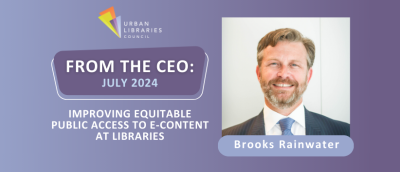Improving Equitable Public Access to E-Content at Libraries

Written by Brooks Rainwater, President and CEO, Urban Libraries Council
Earlier this year, the public radio station in Seattle, KUOW, examined how the high demand for e-books is impacting the budgets of The Seattle Public Library and the King County Library System — and libraries everywhere. At issue: not that the Seattle area has a large population of library patrons, but rather that the increased need for e-book licenses in those collections means increasingly higher costs for libraries.
“I’ve seen three to 10 times as much charged to a library for the same exact material,” Kyle Courtney, director of copyright information policy at Harvard Library, told KUOW about e-book versus print edition costs for libraries.
As digital technologies become increasingly inseparable from the ways that people learn, work and interact, public libraries’ abilities to afford access to e-books, audiobooks and other e-content are more important than ever. This is why ULC has regularly engaged on the need for fair and equitable access and pricing for e-content in libraries across the U.S. and Canada.
In 2019, ULC and the Canadian Urban Libraries Council (CULC) worked together on several efforts to highlight issues around decisions of major e-content publishers. At the time, the publishers imposed increased restrictions on digital lending models for libraries, including embargoes on new content and ceasing perpetual licensing.
While some publishers since then introduced models and pricing structures that are sustainable for libraries, major publishers continue to place severe restrictions on e-book and e-audiobook lending models. This includes unreasonably high prices that far exceed the print equivalent, time-limits on titles purchased, and purchased content that is removed from the lending library.
As the role fulfilled by the public library in our communities became even more prevalent due to the COVID-19 pandemic, ULC is now publishing an expanded statement of support on improving equitable public access to e-content. The statement asks major e-book and audiobook publishers and streaming services to institute fair, transparent and flexible licensing models for public libraries.
You can read the statement and explore our solutions-based approach to e-content issues and advancing sustainable library access to digital content on the ULC website.
Thank you to those on the E-Content Action Team for their help in developing this revised approach that places libraries and their patrons at the forefront of this issue. As next steps, ULC will continue to build a coalition of support among library, literacy and other allied organizations, as well as develop e-content purchasing guidelines with recommended best practices for libraries to follow.
